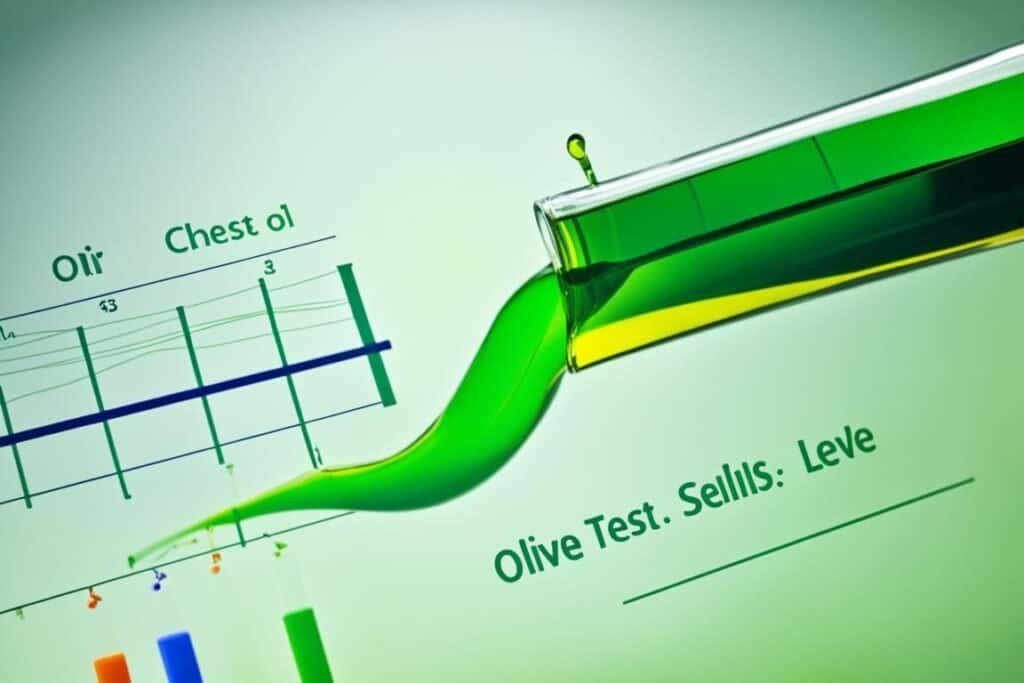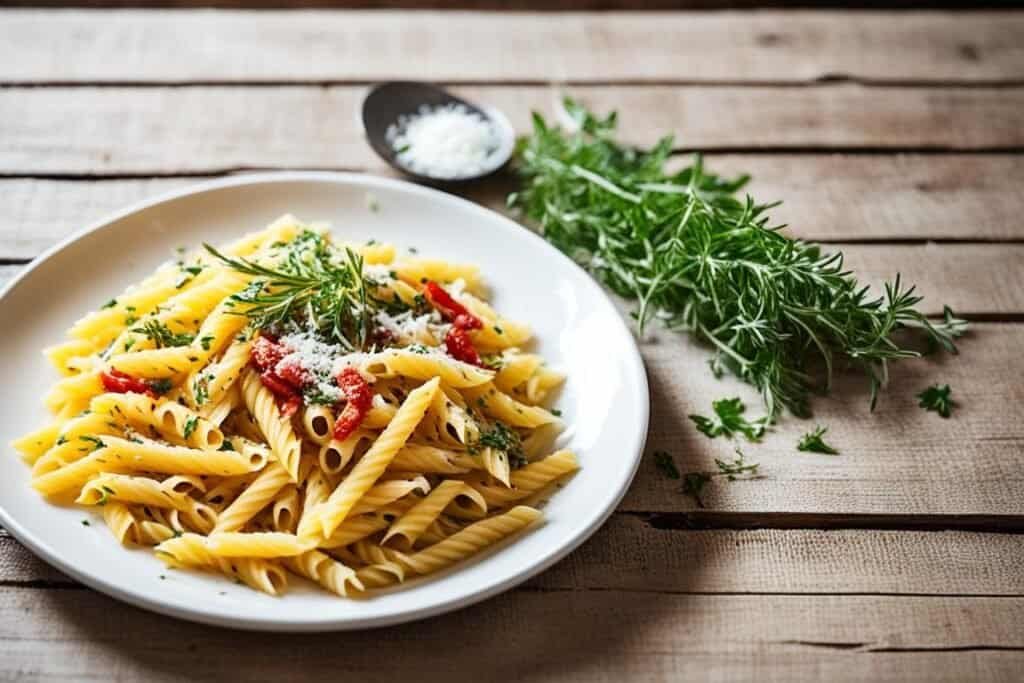Including olive oil in your diet can be a powerful way to lower your cholesterol levels and improve your heart health. High cholesterol, especially “bad” LDL cholesterol, can increase the risk of heart disease and stroke. By incorporating olive oil into your meals, you can potentially reduce LDL cholesterol levels and increase “good” HDL cholesterol levels.
Olive oil offers multiple benefits for managing cholesterol. It contains healthy monounsaturated fats, which can help lower LDL cholesterol. Additionally, olive oil is rich in antioxidants called polyphenols, which have been shown to have a positive effect on cholesterol levels.
Not only does olive oil provide a delicious flavor to your dishes, but it also offers heart-healthy properties. Whether you use it in cooking, drizzle it over salads, or include it in dips and dressings, olive oil can make a significant difference in your cholesterol management efforts.
Key Takeaways:
- Including olive oil in your diet may help lower “bad” LDL cholesterol levels and increase “good” HDL cholesterol levels.
- Olive oil contains healthy monounsaturated fats and antioxidants called polyphenols, which can have a positive effect on cholesterol management.
- Using olive oil in cooking, salads, dips, and dressings is a great way to incorporate it into your meals.
- High cholesterol has no symptoms, so it’s essential to get regular blood tests to monitor your levels.
- By making healthy food choices and including olive oil in your diet, you can improve your cholesterol levels and promote heart health.
What is Cholesterol and its Different Types?
Cholesterol is a waxy, fat-like substance used by the body’s cells. It plays a vital role in hormone production, vitamin D synthesis, and the digestion of foods. While the body can produce all the cholesterol it needs, it can also be obtained from certain animal products.
Cholesterol is transported through the bloodstream by lipoproteins, which are composed of fats (lipids) and proteins. There are different types of lipoproteins that carry cholesterol, each with its own characteristics and effects on health.
- Low-density lipoprotein (LDL) cholesterol: LDL cholesterol is commonly referred to as “bad” cholesterol because high levels of LDL can lead to the buildup of plaque in the arteries. This can increase the risk of heart disease and stroke. It is important to keep LDL cholesterol levels within a healthy range.
- High-density lipoprotein (HDL) cholesterol: HDL cholesterol is often called “good” cholesterol because it helps transport cholesterol from the bloodstream to the liver, where it can be eliminated from the body. Higher levels of HDL cholesterol are associated with a lower risk of heart disease.
- Very low-density lipoprotein (VLDL) cholesterol: VLDL cholesterol carries triglycerides, which are a type of fat derived from excess calories in the diet. Elevated levels of VLDL cholesterol can contribute to the development of plaque in the arteries.
Understanding the different types of cholesterol is essential for managing overall cholesterol levels and reducing the risk of cardiovascular diseases.
Comparison of Different Types of Cholesterol and Their Effects
| Type of Cholesterol | Description | Health Effects |
|---|---|---|
| LDL cholesterol | Low-density lipoprotein | Can contribute to plaque buildup in arteries, increasing the risk of heart disease and stroke |
| HDL cholesterol | High-density lipoprotein | Helps remove cholesterol from the bloodstream, reducing the risk of heart disease |
| VLDL cholesterol | Very low-density lipoprotein | Carries triglycerides and contributes to the development of plaque in the arteries |
Managing cholesterol levels involves keeping LDL cholesterol low, increasing HDL cholesterol, and maintaining a healthy balance of lipoproteins. In the next section, we will explore the impact of olive oil consumption on cholesterol management.
Olive Oil and Cholesterol Levels
Research suggests that incorporating olive oil into your diet can have a positive impact on your cholesterol levels. Studies have shown that olive oil consumption can decrease total cholesterol, LDL cholesterol, and triglyceride levels, while increasing HDL cholesterol more than other plant oils.
The beneficial effects of olive oil on cholesterol may be attributed to its high polyphenol content. Polyphenols are powerful antioxidants that help reduce inflammation and oxidative stress in the body, leading to improved cardiovascular health.
Among different types of olive oils, extra virgin olive oil (EVOO) is considered the most beneficial for cholesterol management. EVOO retains higher levels of polyphenols compared to other processed olive oils, making it a healthier choice.
To assess your cholesterol levels, healthcare professionals often recommend blood tests, such as lipoprotein panels. These tests measure various cholesterol markers, including total cholesterol, LDL cholesterol, HDL cholesterol, and triglycerides, providing valuable insights into your cardiovascular health.

| Cholesterol Marker | Healthy Range | Impact of Olive Oil |
|---|---|---|
| Total Cholesterol | Less than 200 mg/dL | May decrease levels |
| LDL Cholesterol (“bad” cholesterol) | Less than 100 mg/dL (optimal) | May decrease levels |
| HDL Cholesterol (“good” cholesterol) | More than 40 mg/dL (men) More than 50 mg/dL (women) |
May increase levels |
| Triglycerides | Less than 150 mg/dL | May decrease levels |
By incorporating olive oil into your daily diet and making other healthy lifestyle choices, you can effectively manage your cholesterol levels and promote cardiovascular well-being. Remember to opt for extra virgin olive oil for maximum health benefits.
Incorporating Olive Oil in the Diet
When it comes to maintaining a healthy diet, olive oil is a versatile and nutritious ingredient that you can incorporate in various ways. Whether you’re looking to add flavor to your dishes or reap the benefits of its health properties, consuming olive oil can elevate your meals and contribute to your overall well-being.
Using Olive Oil in Cooking
One of the most common ways to use olive oil is in cooking. Its rich flavor and high smoke point make it suitable for a wide range of culinary techniques. Use olive oil to sauté vegetables, sear meat, or roast potatoes for a delicious and heart-healthy alternative to other cooking oils. Its subtle and distinctive taste enhances the natural flavors of the ingredients.
Drizzling Olive Oil Over Salads
Olive oil is an excellent choice for dressing salads, providing a delicate and fruity flavor. Drizzle it over fresh greens, tomatoes, cucumbers, and other vegetables to add a touch of richness and depth. The oil’s smooth texture can coat the leaves evenly, enhancing the overall taste and texture of your salad.
Adding Olive Oil to Dips and Spreads
If you enjoy dips and spreads like hummus or homemade sauces, olive oil can be a nutritious addition. Blend it with ingredients like chickpeas, garlic, and lemon juice to create a creamy and healthy dip. The olive oil not only adds a pleasant taste but also contributes to a smoother and silkier consistency.
Using Olive Oil in Baking
For those who enjoy baking, olive oil can be a beneficial substitute for butter or other solid fats. Its moisture retention properties and unique flavor profile can enhance the texture and taste of baked goods like cakes, muffins, and cookies. Try using olive oil in your favorite recipes to elevate their nutritional value and add a delightful twist.
Drizzling Olive Oil Over Pasta
When enjoying a plate of pasta, substituting traditional sauces with a drizzle of olive oil can offer a healthier alternative. Studies have shown that drizzling olive oil over high-glycemic index foods, like pasta, can help reduce spikes in blood sugar levels. Create a simple and delicious pasta dish by tossing cooked pasta with olive oil, garlic, and some fresh herbs.

Incorporating olive oil into your daily diet can provide numerous health benefits while adding flavor to your meals. Whether you use it for cooking, salad dressings, dips, baking, or as a finishing touch to pasta dishes, olive oil offers a range of culinary possibilities. Start experimenting with olive oil in your favorite recipes and discover the enjoyment of a heart-healthy and delicious addition to your diet.
Foods to Include and Avoid for Cholesterol Management
To lower cholesterol levels, it is recommended to include certain foods in your diet while avoiding others. Incorporating the right foods can help lower your LDL cholesterol (the “bad” cholesterol) and raise your HDL cholesterol (the “good” cholesterol), promoting better heart health.
Here are some foods you should include in your diet to help manage your cholesterol:
- Foods high in soluble fiber: Oatmeal, oat bran, kidney beans, apples, pears, barley, and prunes are excellent sources of soluble fiber. Soluble fiber helps reduce the absorption of cholesterol into the bloodstream, helping to lower LDL cholesterol levels.
- Fish rich in omega-3 fatty acids: Include fatty fish like salmon, mackerel, and sardines in your diet. These fish are high in omega-3 fatty acids, which can help raise HDL cholesterol levels and lower triglycerides.
- Nuts like walnuts and almonds: Walnuts and almonds are packed with nutrients and healthy fats that can improve cholesterol levels. They are a great snack option or can be added to salads, yogurt, or oatmeal.
- Olive oil: Incorporating olive oil into your cooking and salad dressings can have a positive impact on cholesterol levels. Olive oil contains heart-healthy monounsaturated fats that can help lower LDL cholesterol.
- Foods fortified with plant sterols and stanols: Certain food products, like margarines and orange juice, are fortified with plant sterols and stanols. These compounds can help reduce LDL cholesterol levels.
While including these foods, it is equally important to avoid certain foods that can negatively impact your cholesterol levels. Limit your consumption of foods high in saturated and trans fats, such as cheese, fatty meats, desserts, fried foods, and potato chips. These foods can raise LDL cholesterol levels and lower HDL cholesterol levels, increasing the risk of heart disease.
An important aspect of maintaining healthy cholesterol levels is making conscious choices about the foods you include in your diet. By incorporating foods rich in soluble fiber, omega-3 fatty acids, and healthy fats like olive oil, you can help lower your LDL cholesterol and raise your HDL cholesterol, thus promoting a healthy heart.
Conclusion
Incorporating olive oil into your healthy, balanced diet can have a positive impact on your cholesterol management. Studies have shown that olive oil can help lower LDL cholesterol, which is often referred to as “bad” cholesterol, while increasing HDL cholesterol, also known as “good” cholesterol. By improving your cholesterol levels, you can reduce the risk of developing heart disease and stroke.
When using olive oil for cholesterol management, it is important to choose extra virgin olive oil (EVOO). This type of olive oil retains high levels of polyphenols, which are powerful antioxidants that contribute to its health benefits. The polyphenols in olive oil are believed to play a key role in reducing LDL cholesterol and promoting heart health.
To make the most of the benefits of olive oil, it is recommended to include it in your everyday diet. You can drizzle olive oil over salads, sauté vegetables with it, use it in dips, or even substitute it for butter in baking recipes. By incorporating olive oil into your meals and making other healthy food choices, you can proactively improve your cholesterol levels and overall heart health.

